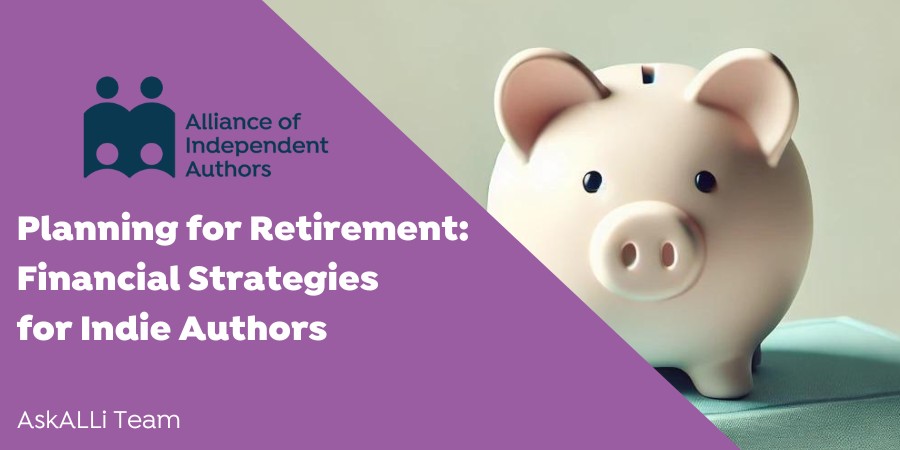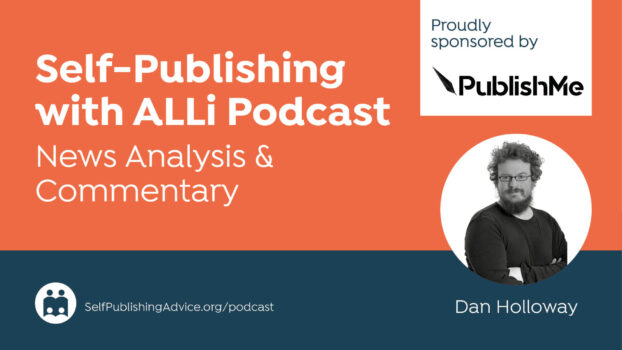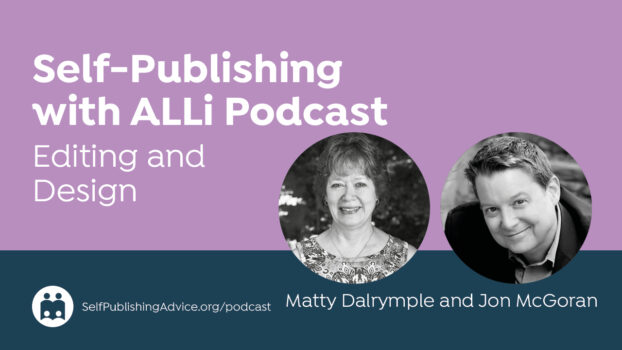When you're an indie author, planning for retirement isn’t usually top of mind. Between writing, marketing, and managing everything that comes with self-publishing, thinking about long-term security often gets pushed aside. But as self-employed creatives, indie authors face unique challenges. Unlike traditional jobs with pensions and automatic retirement savings, authors have to take control of their financial future.
 With income that can be unpredictable, it’s easy to avoid thinking about retirement or unexpected life events like illness or injury. But the longer you wait, the tougher it gets to build a safety net.
With income that can be unpredictable, it’s easy to avoid thinking about retirement or unexpected life events like illness or injury. But the longer you wait, the tougher it gets to build a safety net.
“As indie authors, we often focus so much on the creative process that we neglect long-term financial planning,” said Orna Ross, director of the Alliance of Independent Authors. “But securing income for retirement or in the face of illness or injury is essential for sustaining a creative life. It’s about protecting our freedom to create—today, tomorrow, and well into the future.”
Financial Realities
Financial planning often takes a backseat to writing, but indie authors face unique financial challenges. Without employer benefits like pensions or health insurance, you’re on your own when it comes to long-term financial security. Income can be inconsistent—some months are great, while others are slow—making it hard to save steadily.
That’s why planning for the future is essential. It’s not just about retirement but also having a safety net for emergencies like illness or injury. By building a retirement fund and setting aside savings, you reduce financial stress and free yourself to focus on writing without constantly worrying about money.
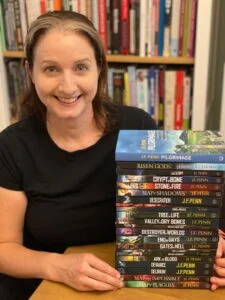
Joanna Penn
Joanna Penn, a successful indie author and entrepreneur, stresses the importance of investing in the future.
“While I love writing, I don’t consider my books my pension as there might come a time when I don’t want to focus so much on marketing or the business side of things, or when I can’t work because of illness,” Penn said.
To avoid falling into the trap of the “poor author” stereotype, she advises diversifying investments, whether through savings accounts, pensions, or index funds. Financial planning ensures that authors can continue to create without being solely dependent on book sales.
Thinking ahead means embracing a mindset shift. Rather than hoping future book sales will cover retirement or unexpected costs, authors need to take control of their finances now. Whether it’s contributing to a pension, investing in stocks, or setting aside money each month, taking small, consistent steps can create financial security. And with that security comes freedom—the freedom to focus on writing and creating, knowing that your financial future is secure.
Building a Retirement Fund
Authors have several options to help build a solid retirement fund, but it requires active planning. Depending on where you live, there are different tax-advantaged accounts available.
IRA (Individual Retirement Account): A tax-advantaged account available in the U.S. where individuals can contribute money towards their retirement. Contributions may be tax-deductible, and earnings grow tax-deferred until withdrawal.
Solo 401K: A retirement savings plan in the U.S. designed for self-employed individuals. It offers the same tax benefits as a regular 401K but allows greater flexibility and contribution limits.
SIPP (Self-Invested Personal Pension): A UK-based retirement account that allows individuals to manage their own investments. Contributions are tax-deductible, and the account offers a wide range of investment choices.
ISA (Individual Savings Account): A tax-free savings account in the UK, where any interest earned on savings or investments is not subject to tax. While not specifically for retirement, ISAs can be a useful tool for long-term savings.

Helen Baggott
The key across all these options is to start early and contribute regularly, even if it’s just small amounts.
Penn shares how she manages her retirement fund.
“I have a SIPP here in the UK, as well as ISAs, and I have direct debit payments to those accounts monthly, as well as contributing lump sums several times a year,” Penn explained.
She invests primarily in low-fee index funds, giving her exposure to global markets and reducing fees. This approach allows her to steadily grow her retirement savings while focusing on her creative work.
For authors still working a day job, author Helen Baggott advises ensuring financial stability before making the leap into full-time writing.
“Do not give up your day job until you are confident that your financial situation is secure,” Baggott said.
She stresses the importance of clearing mortgages and covering essential bills before leaving steady employment.

M. K. Williams
In the United States, author M.K. Williams takes advantage of the Solo 401K program.
“As a full-time author, I don’t have a company-sponsored 401K retirement plan. I have a private one through Fidelity Investments that gives me the same benefits,” Williams explained.
She emphasizes the tax savings that come with contributing to a Solo 401K, adding, “Not only will it ensure that future-you has something saved, but it also reduces your tax liability.”
In 2025, the contribution limit is set at $23,500, allowing authors to reduce their taxable income significantly while saving for the future. For authors with variable income, contributing what they can, even during lean years, is a key strategy for building long-term security.
Insurance Options
Without the benefits that come with traditional employment, authors need to consider their options for health, disability, and income protection insurance. Health insurance is essential for covering medical expenses, while disability and income protection insurance can help safeguard against a loss of earnings if illness or injury prevents you from working.

C. Ruth Taylor
C. Ruth Taylor, an authorpreneur from Jamaica, knows firsthand how challenging it can be to balance creative work with financial planning. Taylor, who spent much of her early career as a teacher and missionary, began writing full-time in 2014, but by 2018, her financial situation became precarious.
“By 2018, my life and health insurance had lapsed. I lost eight years of life insurance savings,” she said.
Determined to turn things around, Taylor switched to an authorpreneurship model in 2018. She began building a business around her books, offering publishing services, training, and coaching to supplement her income. This shift allowed her to secure term life insurance, critical health care, and an individual retirement fund, all while working with a limited budget.
Now, Taylor is building a sustainable income model through her Authorpreneur Secret$ Academy and publishing services business, BambuSparks, ensuring her creative and financial future is secure. She documents this journey in her book, Write and Retire Right: Secrets to Write Non-Fiction Fast and Create Sustainable Income in Retirement. Her experience shows the importance of prioritizing insurance and long-term financial planning to protect yourself and your business, even when faced with financial challenges.
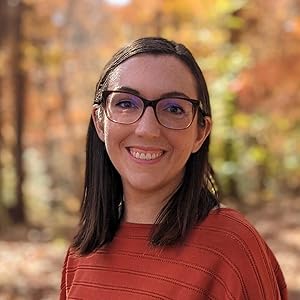
Dena McMurdie
For US-based authors, Health Savings Accounts (HSAs) provide another way to plan for future healthcare costs.
“The Health Savings Account is tax-free forever, and because healthcare is a massive expense as people grow older in the U.S., this is an essential investment for my husband and me,” said author Dena McMurdie.
By contributing to an HSA, indie authors can set aside money for future healthcare expenses while benefiting from the tax advantages that these accounts offer. With rising healthcare costs, planning ahead with tools like an HSA can help cover significant expenses down the line.
Creating a Financial Safety Net
Having an emergency fund is crucial for indie authors, especially with the unpredictability of income. Setting aside money for unexpected expenses or periods of low income can prevent financial stress and allow you to focus on your writing. Financial experts often recommend saving three to six months' worth of living expenses in an easily accessible account. This safety net ensures that if something goes wrong—whether it’s a medical emergency or a slow sales period—you can stay afloat without resorting to debt.

Tom Evans
Tom Evans, an indie author and meditation guide, knows firsthand the importance of building what he calls “sleeping income.” Early in his writing career, Evans set a goal to publish one book a year, hoping that by the time he retired, his royalties would provide him with a steady income. “My book royalties keep me in beer, but that’s about it,” Evans said, acknowledging that his initial plan didn’t generate the financial security he had hoped for. However, Evans didn’t stop there.
From his second book onward, he began creating meditations as a companion to his writing, offering them for free in exchange for email signups. While the model didn’t generate much income initially, his work was discovered by the meditation app Insight Timer in 2015. “Within two or three years, I went from being an unknown author with meditations on the side to becoming an internationally recognized meditation guide,” Evans said. By 2018, Insight Timer introduced a revenue model that allowed Evans to stop trading time for money, generating enough income to focus fully on his creative projects. His story highlights the importance of diversifying revenue streams—whether it’s through books, meditations, or other creative ventures—so you’re not solely reliant on one source of income.
On a more practical level, indie author Dena McMurdie has a simple but effective strategy for financial stability.
“Every month, I save 10 percent of my profit and invest it,” McMurdie said.
She also keeps enough money in her checking account to cover her business expenses, avoiding fees and debt. This habit of consistently setting money aside, even during good months, helps create a financial buffer and builds long-term stability.
Government and Nonprofit Support Programs
 Many countries offer unemployment benefits, disability programs, or other social welfare schemes specifically designed for the self-employed. By researching what’s available, authors can find financial support during periods of illness, injury, or low income, ensuring they have some level of protection even without a traditional employer.
Many countries offer unemployment benefits, disability programs, or other social welfare schemes specifically designed for the self-employed. By researching what’s available, authors can find financial support during periods of illness, injury, or low income, ensuring they have some level of protection even without a traditional employer.
In addition to government support, nonprofit organizations and grants can provide a safety net for authors. Various writing organizations offer grants to authors facing financial difficulties, often due to health issues or other life events. These grants can help cover basic expenses or provide funding for continued creative work, offering vital assistance when it's needed most.
Author Ruth Taylor’s experience demonstrates how unexpected opportunities can arise from a diverse income stream. After facing initial financial difficulties, Taylor connected with an insurance provider who bought one of her books. This relationship led to her securing life and health insurance, which she had previously struggled to maintain. By diversifying income sources and forming strategic partnerships, authors can discover new financial avenues that might not have been obvious before.
Why Creatives Struggle with Financial Planning
 Many creatives, including authors, often push financial planning to the back burner, believing it takes away from their artistic freedom. Joanna Penn notes that for many writers, money feels like a distraction from their creative work. “Far too many authors push away the topic of money,” she said, explaining how this mindset can lead to financial instability in the long run. This avoidance is often tied to a romanticized image of the starving artist, where financial struggles are seen as part of the creative life.
Many creatives, including authors, often push financial planning to the back burner, believing it takes away from their artistic freedom. Joanna Penn notes that for many writers, money feels like a distraction from their creative work. “Far too many authors push away the topic of money,” she said, explaining how this mindset can lead to financial instability in the long run. This avoidance is often tied to a romanticized image of the starving artist, where financial struggles are seen as part of the creative life.
However, this mindset can be a major obstacle to long-term success. Penn emphasizes that learning about money and taking control of finances doesn’t have to diminish creativity—it can actually support it. By addressing financial planning head-on, authors can avoid the stress of financial insecurity, allowing them to focus on their work with more freedom. Understanding that financial stability can coexist with creativity is key to overcoming the hurdles that many authors face when thinking about their financial future.
FIRE Movement
 Penn emphasizes the importance of self-education when it comes to money matters. While she seeks professional advice, she has also spent years learning about financial independence and investing.
Penn emphasizes the importance of self-education when it comes to money matters. While she seeks professional advice, she has also spent years learning about financial independence and investing.
“I have had a financial independence number in mind since I discovered the FIRE movement a decade ago,” Penn said, pointing to how the Financial Independence, Retire Early (FIRE) movement shaped her approach to saving and investing. The FIRE movement promotes a lifestyle of disciplined saving, investing, and financial planning to allow individuals to achieve early retirement and financial freedom.
Advocates of FIRE often focus on cutting expenses, increasing income, and investing in low-cost index funds, aiming to accumulate enough wealth to live off the returns without relying on traditional retirement timelines.
For authors looking to educate themselves, Penn recommends several resources on financial planning for creatives, which she has compiled on her website, The Creative Penn.
Conclusion
While being an indie author offers incredible creative freedom, it also comes with financial responsibilities. Without the safety net of traditional employment benefits, authors need to be proactive in planning for the future. Whether it’s setting up a retirement fund, investing in multiple income streams, or ensuring adequate insurance coverage, careful financial planning is essential to achieving long-term stability. Ignoring these aspects can lead to stress and insecurity, which ultimately detract from the freedom that self-publishing offers.
Ruth Taylor’s goal to “write and retire right” by age fifty serves as a powerful example of how indie authors can take control of their financial future. By setting clear goals, diversifying her income streams, and securing insurance and retirement plans, Taylor has positioned herself to continue doing the work she loves without the worry of financial instability.
In the end, financial planning doesn’t just protect your future—it supports your present. By taking steps now to secure your financial well-being, you can focus more on your creative pursuits without the constant stress of money worries. Indie authors have the freedom to shape their careers, and with smart financial planning, that freedom can last a lifetime.
Further Resources
- Money Basics for Indie Authors
- SelfPub3: Author Business Campaign
- Business Models for Authors
- The Ultimate Guide to Leveling Up Your Author Business
Thoughts or further questions on this post or any self-publishing issue?
 If you’re an ALLi member, head over to the SelfPubConnect forum for support from our experienced community of indie authors, advisors, and our own ALLi team. Simply create an account (if you haven’t already) to request to join the forum and get going.
If you’re an ALLi member, head over to the SelfPubConnect forum for support from our experienced community of indie authors, advisors, and our own ALLi team. Simply create an account (if you haven’t already) to request to join the forum and get going.
Non-members looking for more information can search our extensive archive of blog posts and podcast episodes packed with tips and advice at ALLi's Self-Publishing Advice Center.

